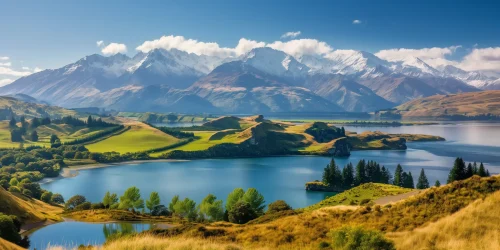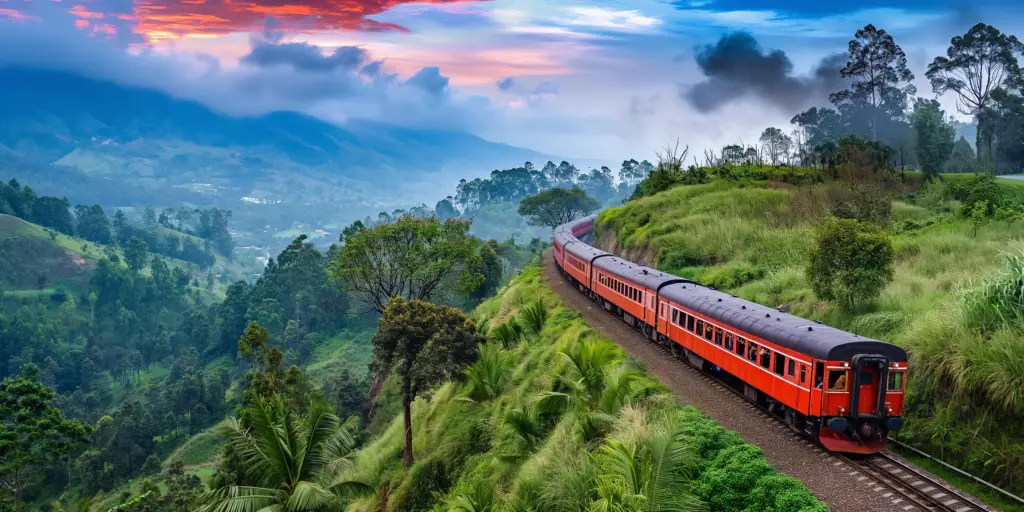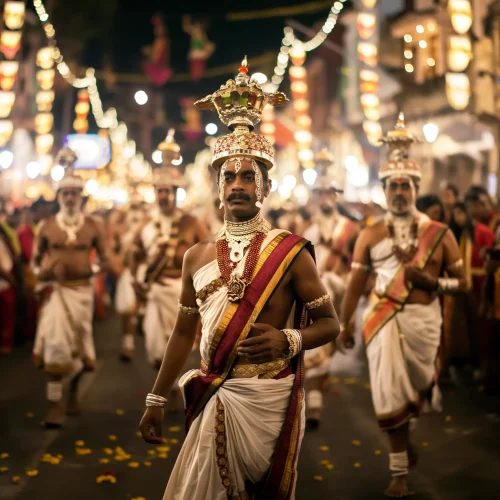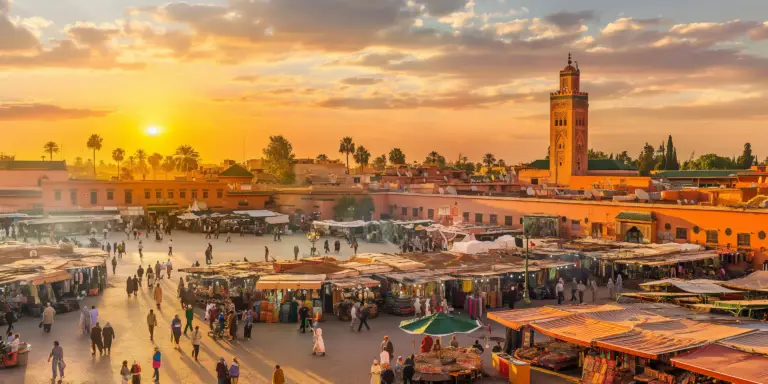Sri Lanka is a jewel of an island that offers a treasure trove of experiences for every kind of traveler. Whether you’re seeking sun-kissed beaches, lush highlands, ancient ruins, vibrant wildlife, or a rich cultural tapestry, Sri Lanka has it all. The allure of this island nation lies in its diversity and the warmth of its people, making it a perfect destination for those looking to explore, relax, and immerse themselves in a unique blend of natural beauty and cultural heritage.
As you begin your journey to Sri Lanka, your adventure will most likely start at the Bandaranaike International Airport, a bustling gateway located near Colombo. From the moment you step off the plane, the humid, tropical air will greet you, signaling the start of your exotic escapade. Colombo, the vibrant capital city, is a melting pot of cultures, with bustling markets, colonial architecture, and a burgeoning food scene. Here, you can take a leisurely stroll along Galle Face Green, sample spicy street food, and explore the historical Colombo Fort area. However, Colombo is just the beginning, and the true magic of Sri Lanka lies beyond its urban centers.
For beach lovers, Sri Lanka’s coastline is nothing short of paradise. The southern coast, with gems like Mirissa and Unawatuna, offers pristine sandy shores lined with coconut palms and clear blue waters perfect for swimming, snorkeling, and surfing. Mirissa, in particular, is renowned for its whale watching tours, where you can witness the majestic blue whales and playful dolphins in their natural habitat. If you venture east, Arugam Bay awaits, a surfer’s haven known for its perfect waves and laid-back vibe.
In contrast to the sun-soaked beaches, the central highlands provide a cool, refreshing escape. The journey to the hill country is an adventure in itself, with scenic train rides from Colombo to Kandy or from Kandy to Ella, offering breathtaking views of rolling tea plantations, misty mountains, and cascading waterfalls. Kandy, the cultural capital, is home to the sacred Temple of the Tooth Relic, one of the most revered Buddhist sites in the world. The temple, with its intricate architecture and serene atmosphere, is a must-visit, especially during the Esala Perahera festival when the city comes alive with vibrant parades and traditional performances.
Continuing further into the highlands, you will find Nuwara Eliya, often referred to as “Little England” due to its colonial-era architecture and temperate climate. This charming town, surrounded by lush greenery and tea estates, offers a perfect setting for leisurely walks, horse riding, and of course, a visit to a tea factory to learn about the production of world-famous Ceylon tea. Sipping a cup of freshly brewed tea while overlooking the verdant hills is an experience not to be missed.
For those fascinated by history and archaeology, Sri Lanka’s ancient cities are a treasure trove waiting to be explored. The Cultural Triangle, which includes Anuradhapura, Polonnaruwa, and Sigiriya, is rich with archaeological wonders and UNESCO World Heritage Sites. Anuradhapura, the first capital of Sri Lanka, is a sprawling complex of well-preserved ruins, including ancient stupas, monasteries, and palaces. Polonnaruwa, the medieval capital, is equally impressive with its stunning statues, temples, and the famous Gal Vihara rock sculptures.
Sigiriya, often referred to as the “Eighth Wonder of the World,” is a dramatic rock fortress that rises majestically from the central plains. Climbing to the top is a rewarding challenge, with ancient frescoes, mirror walls, and breathtaking panoramic views waiting at the summit. The surrounding area also offers the lesser-known but equally fascinating Dambulla Cave Temple, where you can explore a series of caves adorned with beautiful Buddhist mural paintings and statues.
Nature enthusiasts will find Sri Lanka a paradise for wildlife and outdoor activities. Yala National Park, one of the country’s premier wildlife destinations, is home to a diverse array of animals, including the elusive leopard, elephants, sloth bears, and a plethora of bird species. A safari through Yala offers an exhilarating opportunity to see these magnificent creatures up close in their natural habitat. Udawalawe National Park, another excellent option, is renowned for its large elephant population and provides a more serene and less crowded safari experience.
For those looking to delve deeper into the natural wonders, Sri Lanka’s biodiversity extends beyond its national parks. The island’s varied ecosystems include rainforests, coastal wetlands, and highland forests, making it a haven for bird watchers and nature lovers. Sinharaja Forest Reserve, a UNESCO World Heritage Site, is a biodiversity hotspot teeming with endemic flora and fauna, offering guided treks through lush, dense forests.
Adventure seekers are not left wanting in Sri Lanka. From the adrenaline-pumping waves of Arugam Bay to the challenging hikes up Adam’s Peak, there’s something for every thrill-seeker. Adam’s Peak, or Sri Pada, is a sacred mountain with a footprint-shaped mark at its summit, revered by multiple religions. The climb, traditionally undertaken at night to reach the peak by dawn, rewards trekkers with a stunning sunrise and panoramic views that make the effort worthwhile.
Sri Lankan cuisine is another highlight that will captivate your senses. The island’s culinary scene is a delightful blend of flavors, influenced by its diverse cultures and abundant natural resources. From the ubiquitous rice and curry, bursting with spices and accompanied by a variety of side dishes, to street food favorites like hoppers (bowl-shaped pancakes) and kottu roti (chopped roti stir-fried with vegetables and meat), there’s a culinary adventure waiting around every corner. Seafood lovers will be in heaven, with fresh catches like crab, prawns, and fish served in delectable local styles.
No trip to Sri Lanka would be complete without experiencing its warm hospitality and engaging with the local culture. Sri Lankans are known for their friendliness and generosity, and you’ll often find yourself invited to join in local festivities or simply to share a cup of tea. Staying in a local guesthouse or a boutique hotel can offer a more personalized experience, allowing you to connect with the people and the place on a deeper level.
As you travel through Sri Lanka, you’ll also notice a strong emphasis on sustainability and eco-friendly practices. Many accommodations and tour operators are committed to responsible tourism, ensuring that the natural and cultural heritage of the island is preserved for future generations. Whether it’s staying at an eco-lodge in the jungle, participating in community-based tourism projects, or simply being mindful of your environmental impact, there are numerous ways to travel sustainably in Sri Lanka.
Traveling in Sri Lanka is relatively easy and affordable. The country’s compact size means you can experience a variety of landscapes and activities within a short period. Domestic travel options include scenic train journeys, comfortable buses, and private car hires, often with a knowledgeable driver who can double as a guide. For short distances within cities and towns, tuk-tuks provide a convenient and quintessentially Sri Lankan mode of transport.
Health and safety are paramount when traveling, and Sri Lanka is generally a safe destination with friendly locals and low crime rates. However, it’s always wise to take standard precautions, such as keeping an eye on your belongings in crowded places and using reputable services. Staying hydrated, using mosquito repellent, and being cautious with street food can help ensure a healthy trip. Comprehensive travel insurance is also recommended to cover any unforeseen circumstances.
Before embarking on your Sri Lankan adventure, it’s important to be well-prepared. Here are some essential tips and things to be aware of that will help ensure your trip is smooth, enjoyable, and culturally respectful. From visa requirements to local customs, these pointers will equip you with the knowledge you need to make the most of your journey to this enchanting island.
- Visa Requirements: Ensure you obtain an Electronic Travel Authorization (ETA) before arriving in Sri Lanka.
- Currency: The local currency is the Sri Lankan Rupee (LKR). It’s advisable to carry some cash for small purchases, especially in rural areas.
- Language: Sinhala and Tamil are the official languages, but English is widely spoken, especially in tourist areas.
- Climate: Sri Lanka has a tropical climate with two main monsoon seasons. The southwest monsoon affects the west and south coasts from May to September, while the northeast monsoon affects the east coast from October to February.
- Packing Essentials: Lightweight clothing, sunscreen, insect repellent, a hat, and comfortable walking shoes. Pack a light sweater for the cooler highlands.
- Health Precautions: Stay hydrated, use mosquito repellent, and be cautious with street food. Carry any necessary medications and consider travel insurance.
- Cultural Sensitivity: Dress modestly when visiting religious sites, and remove your shoes and hats before entering temples. Respect local customs and traditions.
- Transportation: Tuk-tuks are a convenient mode of transport for short distances. For longer journeys, consider trains, buses, or hiring a private car with a driver.
- Safety: Sri Lanka is generally safe, but take standard precautions such as keeping an eye on your belongings and avoiding isolated areas at night.
- Accommodation: Options range from budget hostels to luxury resorts. Consider staying in eco-lodges or boutique hotels for a more personalized experience.
- Local Cuisine: Try the local dishes such as rice and curry, hoppers, and kottu roti. Be mindful of spice levels if you’re not accustomed to spicy food.
- Sustainable Travel: Support eco-friendly accommodations and tour operators. Be mindful of your environmental impact and participate in community-based tourism projects.
- Connectivity: SIM cards with data plans are affordable and widely available. Wi-Fi is available in most hotels and cafes.
- Electricity: The standard voltage is 230V, and the power plugs are of type D, M, and G. It’s a good idea to carry a universal adapter.
- Travel Insurance: Highly recommended to cover any unforeseen circumstances, including medical emergencies and travel disruptions.
- Festivals and Events: Sri Lanka has a vibrant calendar of festivals. Plan your trip around events like the Esala Perahera in Kandy for a unique cultural experience.
- Local Etiquette: Greet locals with a smile, and use your right hand for eating and passing items. Tipping is appreciated in restaurants and for services.
By keeping these tips in mind, you can ensure a smooth and enjoyable trip to Sri Lanka!









